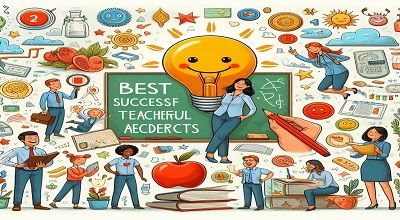Successful Teachers Do Differently
Successful Teachers Do Differently: While teaching styles and approaches may vary, successful teachers often share common characteristics and practices that contribute to their effectiveness. Here are 20 things that successful teachers tend to do differently:
Build Positive Relationships:
Successful teachers prioritize building strong, positive relationships with their students. They create a supportive and inclusive classroom environment.
Set High Expectations:
They set high expectations for their students, encouraging them to strive for excellence and reach their full potential.
Effective Classroom Management:
Successful teachers have effective classroom management skills. They establish clear rules and routines, and they address behavior issues consistently and fairly.
Adaptability:
They are adaptable and flexible, adjusting their teaching methods to meet the diverse needs of their students.
Passion for Teaching:
Successful teachers are passionate about their subject matter and convey that enthusiasm to their students. This passion can inspire a love of learning.
Continuous Learning:
They are lifelong learners themselves, staying updated on educational research, new teaching methods, and technologies.
Effective Communication:
They communicate clearly and effectively with both students and parents, keeping them informed about classroom activities, expectations, and student progress.
Differentiated Instruction:
Successful teachers tailor their instruction to accommodate different learning styles and abilities within the classroom.
Provide Constructive Feedback:
They offer constructive feedback to help students understand their strengths and areas for improvement.
Creativity:
Successful teachers incorporate creativity into their lessons, making learning engaging and memorable.
Cultivate a Growth Mindset:
They foster a growth mindset in their students, encouraging them to see challenges as opportunities for growth.
Encourage Critical Thinking:
They promote critical thinking skills by asking thought-provoking questions and encouraging students to analyze and solve problems.
Use Technology Wisely:
Successful teachers leverage technology to enhance learning experiences but use it judiciously, ensuring it complements rather than replaces traditional teaching methods.
Create a Safe Environment:
They prioritize creating a safe and inclusive learning environment where students feel comfortable expressing themselves.
Collaboration:
Successful teachers collaborate with colleagues, sharing ideas and strategies to enhance their teaching practices.
Organizational Skills:
They are well organized, managing their time effectively, and keeping track of student progress and assessments.
Celebrate Successes:
They celebrate both small and big successes, fostering a positive atmosphere in the classroom.
Embrace Diversity:
Successful teachers embrace diversity, recognizing and valuing the unique backgrounds and perspectives of their students.
Reflective Practice:
They engage in reflective practice, regularly evaluating their teaching methods and seeking ways to improve.
Involve Parents:
They involve parents in the learning process, encouraging open communication and collaboration between home and school.
These practices collectively contribute to the effectiveness and success of teachers in fostering a positive and enriching learning environment for their students.
